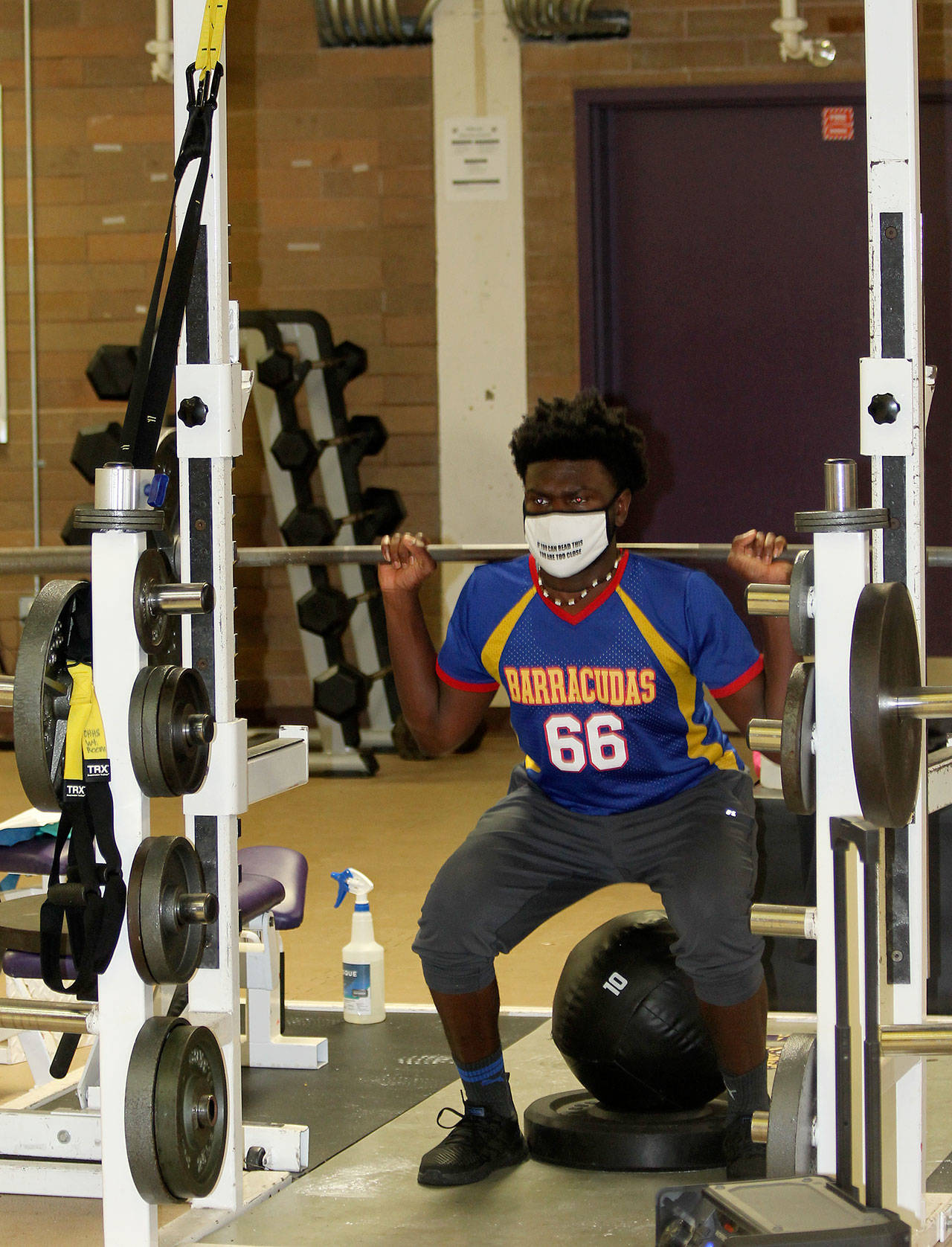After being pushed around on the field last fall, Oak Harbor High School football players decided the best way to push back is to push weights.
Many factors figured into the Wildcats’ lackluster 2-8 record in 2019, but none was more glaring than the team’s lack of physical competitiveness.
Oak Harbor fielded a young team (30 of the 40 letter winners were underclassmen), and compounding the lack of experience was the lack of size and strength.
Coach Jay Turner and his staff resigned at the end of he 2018 season, and during the gap before new coach Marcus Hughes was hired, the small senior class didn’t pick up the leadership slack and encourage its teammates to work in the offseason.
Hughes, his staff, strength coach Colby Heefner and the 2020-21 seniors decided the best way to change the results was to change the attitude about offseason conditioning.
“We were dominated physically last year in almost every game,” Hughes said. “There was a major lack of off season commitment from last year, and it showed on the field. So Colby, myself and the coaches knew that we needed to change the culture and build an offseason program where the kids buy in.”
Heefner said his primary goal became getting the athletes better prepared for the rigors of football.
“It was the goal because we were both undersized last year and physically weaker than almost all of our competition,” Heefner said. “There were many reasons on why last year didn’t go as planned, but one that we could easily fix in the offseason was our weight and strength issue.”
“This offseason’s success in the weight room should be credited to coach Hughes and how much emphasis he placed on the importance of training for our team,” Heefner added. “He stressed the importance and showed up nearly every day to observe his team. This showed to the athletes that the coach cares and it is important for our future success.”
The team currently works out three days a week and averages about 60 athletes per day through its social-distanced groups. Last year, only 10 athletes consistently showed up, according to senior Nate Hummel.
“There is more intensity, more of a winning attitude this year,” Hummel said. “We saw what happened last year — we lost and we didn’t have fun.”
Junior Nolan Byng said the team saw the results of not working last year, adding that this year’s seniors are “a lot more motivated and sharing with the younger players on what we should do to get better.”
Senior Caden Leckelt said “our lack of strength was our biggest weakness last year and we were being thrown all over the field. We realized we needed to be in here lifting weights to be competitive.”
Heefner said Hummel, Byng and seniors Chris Hoppock, Ethen Decherong and Ezra Decherong have been the leaders in getting the other players on board, receiving substantial help from Leckelt; seniors Jake Mitten, Brenden Andersen and Bennett Anderson; and juniors Aaron King and Kaito White.
Hughes said Heefner has been “amazing” in implementing the coach’s vision for an offseason program.
“I have had three coaches (Fernando Espinoza, Cody Anderson and Ted Houck) that have really spend a lot of time in weight room with kids and getting a hold of them and holding them accountable as well,” he said.
“I am also extremely proud of the players and their sacrifices and dedication to wanting to improve and be better,” he added.
The results of the offseason program have been dramatic.
The average weight gain per player from November 2019 is 20 pounds (174 to 194), according to Hughes.
“Gaining weight was not necessarily the goal, but we needed to get way stronger and gaining weight comes with getting stronger,” Hughes said.
“In terms of their personal lifting numbers, the average one rep max bench press went up 30 pounds, one rep max back squat went up 70 pounds and the one rep max average deadlift went up 40 pounds through almost 60 tested athletes,” Hughes said.
The coaches and players are excited to see how the changes play out on the field but will have to wait; the season has been postponed until February because of COVID-19.
They see the delay as an opportunity to continue to develop.
“Honestly, I think it (the delay) is really helping us,” Leckelt said. He added that not only are the players able to get stronger, but it also allows them more time for “field work,” getting more familiar with the new system implemented by the new coaching staff last fall.
Byng said, “I think for the most part, the delay is a good thing; it is giving our bodies more time to get fit, to get mature.”
Hummel added, “We have to roll with what we have (in regard to the coronavirus restrictions). When we start in February it should be safer.”
Heefner pointed out that all athletes, not just football players, can benefit from weight training.
“Any sports team looking to improve without even practicing their sport in the offseason should buy into a weight-lifting program,” Heefner said. “I have seen it with multiple teams now, and they will be much more competitive this year.”
Not only does weight training make athletes bigger, stronger and faster, Heefner said, but it also builds confidence and reduces the risk of injury.
For the Oak Harbor High School football team, it will have to wait to see if pushing iron pushes it up the conference standings.



